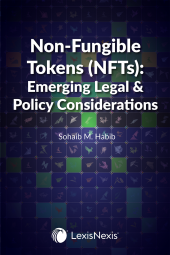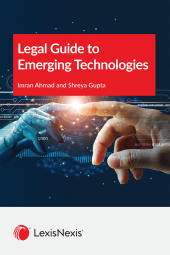A Practical Guide to Web3, Blockchain, and Smart Contract Law, 3rd Edition
Industry leaders provide insightful analysis on how emerging advances in Web3, Blockchain, and Metaverse law interact within new and existing legal frameworks. Formerly published as A Practical Guide to Smart Contracts and Blockchain Law.
One Year Subscription Only Terms
Subscribers receive the product(s) listed on the Order Form and any Updates made available during the annual subscription period. Shipping and handling fees are not included in the annual price.
Subscribers are advised of the number of Updates that were made to the particular publication the prior year. The number of Updates may vary due to developments in the law and other publishing issues, but subscribers may use this as a rough estimate of future shipments. Subscribers may call Customer Support at 800-833-9844 for additional information.
Subscribers may cancel this subscription by: calling Customer Support at 800-833-9844; emailing customer.support@lexisnexis.com; or returning the invoice marked 'CANCEL'.
If subscribers cancel within 30 days after the product is ordered or received and return the product at their expense, then they will receive a full credit of the price for the annual subscription.
If subscribers cancel between 31 and 60 days after the invoice date and return the product at their expense, then they will receive a 5/6th credit of the price for the annual subscription. No credit will be given for cancellations more than 60 days after the invoice date. To receive any credit, subscriber must return all product(s) shipped during the year at their expense within the applicable cancellation period listed above.
Détails des produits
A Practical Guide to Web3, Blockchain, and Smart Contract Law is an essential handbook for lawyers, accountants, academics, business people, and others operating in the Blockchain space. This third edition of one of the first Blockchain law textbooks in the world effectively shines a light on what people perceive to be a “gray area” in the law by addressing a broad range of topics, including securities, tax, business structuring, proceeds of crime and anti-money laundering, smart contracts, estate issues, and much more.
Each chapter of A Practical Guide to Web3, Blockchain, and Smart Contract Law, 3rd Edition is written by a professional at the forefront of the world’s legal, accounting, and academic Blockchain community. The analysis of this evolving area of law is, thus, approached through an interdisciplinary lens that provides a practical and holistic view of how emerging advances in Web3, Blockchain, and Metaverse law interact within new and existing legal frameworks.
What’s New In This Edition
- Coverage of recent developments introduced by the 2023 Canadian budget and European regulatory changes
- Expanded content on evolving topics such as Web3 and Metaverse law
- Discussion of the recent collapse of several high-profile cryptocurrency exchanges, including FTX Trading Ltd., Celsius Network LLC, and Voyager Digital LLC
Who Should Read This Book
- Corporate lawyers who advise clients on compliance requirements and setting up best practices for dealing with financial technology laws and the impact it has on other disciplines, such as tax or insurance
- Technology lawyers who need to understand developing financial technology laws
- In-house lawyers working with Blockchains who need to advise on legal and regulatory considerations surrounding Fintech topics of due diligence and insurance
- Accountants who must become familiar with the tax treatment of digital assets
- Investment advisors who must apprise themselves of a burgeoning new asset class
- Entrepreneurs and businesses in the technology sector who must be familiar with the shifting commercial and regulatory landscape
Contributing Authors
Adam Vaziri
Alexander Di Giovanni
Alisha Butani
Amber D. Scott
Carol R. Van Cleef
Eric Fader
Jay Tulsani
Justin Wales
Justin Cole
Kunal Parshotam
Matthew Rappard
Natalie Bravo
Paul Horbal
Pulat Yunusov
Raffael Mazze
Stephen Pederson
Toufic Adlouni
Table des matières
Introduction: Disrupting Conventional Wisdom
Chapter 1: Blockchain Securities Issues
§1.01 Securities Law Considerations for Blockchain/Digital Asset Offerings – Aaron Grinhaus
§1.02. Cryptocurrency and the Evolution of Securities Regulations on Blockchain Technologies – Justin Wales and Natalie Bravo
§1.03. Overview of the Proposed European Union Markets in Crypto Assets Regulations – Aaron Grinhaus and Adam Vaziri
§1.04. Crypto Assets in Regulatory and Civil Proceedings – Evan Thomas, updated by Toufic Adlouni
§1.05. Airdrops, Token Bounties and Dividends: An Overview – Steve Parr and Stephen Pederson
Chapter 2: Tax Implications of Web3 and Blockchain Technology
§2.01. United States Federal, State, and Local Direct and Indirect Taxation of Virtual Currencies and Blockchain Assets – Alisha Butani and Eric Fader
§2.02. Overview of the Taxation of Cryptocurrencies – Raffael Mazze and Kunal Parshotam
§2.03. Blockchain Business Structuring and Tax Considerations in Canada – Aaron Grinhaus
§2.04. Indirect Tax Implications of Cryptocurrencies and Blockchain Technology – Jay Tulsani
§2.05. Blockchain Business Structuring: Offshore Foundations and International Business Companies – Justin Cole
Chapter 3: Proceeds of Crime and Anti-Money Laundering Issues With Cryptographic Assets
§3.01. Introduction to Money Laundering, Terrorist Financing and Proliferation Financing
§3.02. Setting the International Stage: FATF Guidance on ML, TF & PF
§3.03. Down the Rabbit Hole: FATF Guidance on Virtual Assets
§3.04. Canada: AML Legislation
§3.05. U.S.: Implementation and Enforcement
§3.06. Europe: Implementation and Enforcement
§3.07. U.K. Implementation and Enforcement
§3.08. Asia: Implementation and Enforcement
§3.09. The Evolving Landscape and Challenges
§3.10. Appendix I: Acronyms
§3.11. Appendix II: FATF Recommendations (Summary)
Chapter 4: The Law of Smart Contracts
§4.01. Introduction to Smart Contracts and the Law – Pulat Yunusov
§4.02. Smart Contracts 101 – From a Technical to a Legal Understanding – Perma Banigan, Matthew Rappard and Zachary Skeith
Chapter 5: Intellectual Property in Blockchain and Distributed Ledger Technology – Paul Horbal
§5.01. Introduction
§5.02. Patents
§5.03. Copyright
§5.04. Industrial Design Rights
§5.05. Trademarks
§5.06. NFTs – A Case Study in IP
§5.07. Conclusion
Chapter 6: Estate Planning and Digital Assets – Aaron Grinhaus
§6.01. Introduction
§6.02. Digital Asset Succession Problems
§6.03. Estate Structuring For Digital Assets
§6.04. Conclusion
Chapter 7: Security Issues for Cryptographic Asset Wallets – R. Travis Leppky and Guy Sadeh
§7.01. What Are Cryptocurrency Wallets and What Is Their Purpose?
§7.02. Security Issues Applicable to Wallets
§7.03. Security Issues Specific to Private Blockchain Networks
§7.04. Conclusion
Chapter 8: Overview of Treatment of Cryptocurrency in Insolvency – Amy ter Haar
§8.01. Cryptocurrency Treatment in Insolvency Proceedings
§8.02. Token Holder Protections and Valuations
§8.03. Conclusions on Insolvency Treatment of Cryptocurrencies
Chapter 9: Central Banks Digital Currencies
§9.01. Central Banks Digital Currencies: Significance, Developments and Analysis Relating to the Implementation of a Digital Dollar – Alexander Di Giovanni
§9.02. Decentralized Finance Using Blockchain Technology: Use Cases
Table of Cases
Index
 Lexis Nexis
Lexis Nexis 



